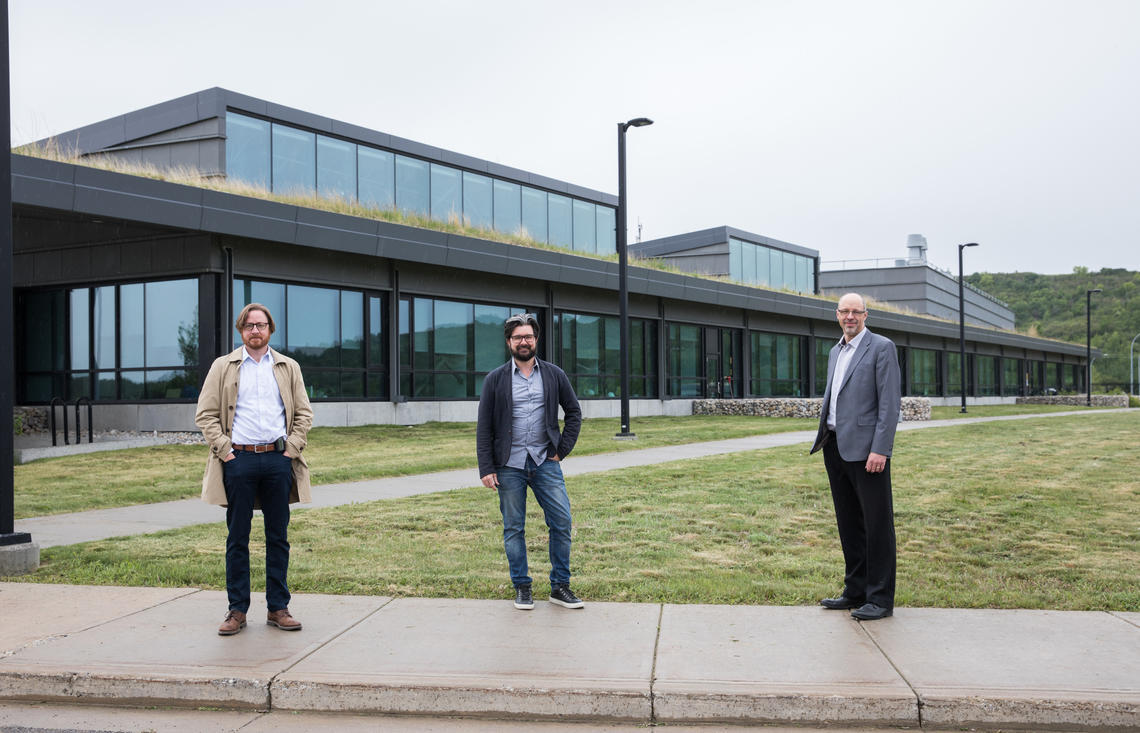July 8, 2021
Research proves that testing hospital wastewater for COVID-19 can help catch localized outbreaks faster
A study at three Calgary hospitals has proven that testing wastewater for COVID-19 can help identify cases and predict outbreaks in individual high-risk facilities.
University of Calgary researchers from the Snyder Institute for Chronic Diseases at the Cumming School of Medicine, the Faculty of Science, Schulich School of Engineering and Advancing Canadian Wastewater Assets (ACWA) made this finding as part of their ongoing monitoring of wastewater in Calgary and area for COVID-19, in partnership with The City of Calgary and Alberta Health Services.
“Wastewater monitoring can give an early warning of infection. It is quite sensitive, can be used to detect variants, and in individual facilities it strongly predicts outbreaks and new cases,” says Dr. Michael Parkins, MD, associate professor in the Cumming School of Medicine and member of the Snyder Institute for Chronic Diseases.

Michael Parkins, Casey Hubert and Kevin Frankowski lead the COVID-19 wastewater monitoring project.
Adrian Shellard
Surprising results
The team expected rates of SARS-CoV-2 in hospital wastewater to increase as more COVID-19 patients were admitted to the hospital, but were surprised to see the data show values spiking when hospital-acquired infections occurred.
“This shows that the bulk of traces of COVID-19 detected in wastewater corresponds to infections just prior to or at symptom onset, and it clearly shows the value of wastewater monitoring,” says Parkins.
“Wastewater provides a more immediate signal than the clinical case data. Hospitals were ideal for demonstrating this concept because we could compare wastewater signals to comprehensive clinical data on patients. This adds confidence for monitoring in other high-risk locations, like meat-packing plants or long-term care facilities, where wastewater monitoring can stop an outbreak before it starts,” Parkins says.
Points to critical role for wastewater testing
The study, published in Water Research, provides additional proof that wastewater testing has a critical role in monitoring individual facilities as the COVID-19 pandemic seems to be waning in Canada.
“Despite recent good news, the current pandemic is not over yet,” says Kevin Frankowski, executive director of ACWA, pointing to the emergence of Delta variant cases and the situation in the UK. “With fewer people getting clinically tested, some choosing not to vaccinate, and the fact there is currently no vaccination available for children under 12, wastewater monitoring will become increasingly important to give early warning of variants or new waves.”
“We are likely to see a lot more asymptomatic or minimally symptomatic infections, and wastewater testing is the best way of comprehensively monitoring the situation,” says Parkins.
Useful for detecting Delta variant
Monitoring through the summer will be critical to keep variants in check, says the team.
“If the Delta variant increases in Calgary, that trend will show up first in wastewater samples,” says Dr. Casey Hubert, PhD, associate professor in the Faculty of Science. The team’s second and third wave data from Calgary’s wastewater treatment plants shows about six days of early warning compared to clinical case identifications.
“This hospital study shows the value of a localized sampling strategy. Testing at different scales means our autosamplers could be applied in under-vaccinated areas, in addition to city-wide monitoring at wastewater treatment plants. Detecting a wastewater signal can provide precious extra time for a public health response,” says Hubert.
Wastewater monitoring and the future of public health
In addition to sampling twice weekly at the three hospitals, the team has been monitoring SARS-CoV-2 in seven targeted neighbourhoods, on top of Calgary’s three wastewater treatment plants. Results are shared with the public in near real-time online on the Centre for Health Informatics COVID-19 Tracker.
The work has been supported through a CIHR research grant, but that initial funding has concluded. Additional investment will enable the researchers to grow and develop their program, in line with government-funded work already underway in other provinces. The group is actively seeking sustainable funding to make wastewater testing an ongoing part of Alberta’s public health program.
The study in Water Research underscores the group’s call for wastewater monitoring to play a critical role in the future of public health monitoring. The group believes Alberta can be a leader in this area, pointing to ACWA, the Urban Alliance partnership with the City of Calgary, and their research collaboration with the University of Alberta as unique and effective assets.
Powerful tool for public health
“Wastewater monitoring is a powerful tool to enable public health protection across a wide range of risks, whether those be a future pandemic, other infectious diseases, and other public health concerns such as alcohol, nicotine and drug use,” says Frankowski. For example, wastewater monitoring could be used in long-term care and other congregate living facilities during flu season to help protect residents and workers from an outbreak that could be fatal to those with lowered immune systems.
It’s that potential that the group wants to unlock next, as they keep tracking the COVID-19 pandemic, while also looking to the future. “Wastewater testing is inherently inclusive, assessing the health of all members of society and does so at a tiny fraction of the cost of clinical testing,” says Parkins. “It can revolutionize public health surveillance and monitoring.”
Michael Parkins is an associate professor in the departments of Medicine, and Microbiology, Immunology and Infectious Diseases at the Cumming School of Medicine. He is a member of the Snyder Institute for Chronic Diseases. He is section chief of infectious disease, Calgary Zone Alberta Health Services.
Casey Hubert is an associate professor in the department of Biological Sciences in the Faculty of Science and Campus Alberta Innovates Program Chair in Geomicrobiology.
Kevin Frankowski is the executive director of Advancing Canadian Wastewater Assets, a globally unique test bed and research facility where researchers, municipalities and industry can de-risk wastewater treatment and monitoring technologies. It is a partnership between the University of Calgary and The City of Calgary, as part of the Urban Alliance.
